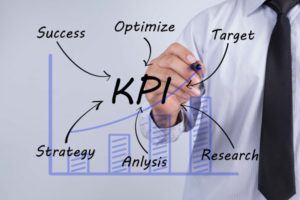Take the guesswork out of your business performance
In the IT world, we sure like our acronyms and initials: CPU, HTTPS, ICMP …
But have you heard the initialism KPI yet?
As it turns out, KPIs are one of the most important tools for thriving, growing organizations, but surprisingly few people are using them.
KPI stands for Key Performance Indicator. It’s a way to measure how your business — and even the individuals within it — is performing.
How do you use a KPI?
Basically you lay out your top strategic objectives, and decide on quantifiable values that indicate how well your business is achieving them.
As you collect this measurable data, you can create a nice visual of how healthy and effective your business is, and how your clients feel about you.
-Maybe you want to use a star-based online review metric and a customer comments bar to gauge customer satisfaction.
-Or maybe you want to track website conversion rates and time spent on site.
-Many industries choose to measure the wait time their clients experience between a service call and receiving service.
Types of KPIs
So how do you go about choosing your KPIs?
As you probably noticed from the examples above, the answer will differ depending on what industry you’re in and exactly which areas of the organization you want to hone in on, but it may be helpful to browse some ideas for types of KPIs on Klipfolio’s website.
Regardless of the type of KPI that best suits your organization, you want to make sure you land on something that has:
- Clear language
- A clear objective
- A practical method of measurement
As your business grows and changes, you may feel the need to tweak your KPIs. That’s fantastic! You can continually improve your KPIs for clarity, attainability, or relevance as you see fit.
How to measure your KPIs
Once you find the right KPI, the next step is to communicate it clearly and regularly to your staff.
This helps set the team’s trajectory. We’ll talk about it more in a bit, but there are visually appealing KPI dashboards that allow your whole team to have a real-time visual of everyone’s success in meeting the KPI, which can be tremendous for team unity and morale — even if your employees work remotely.
With a clear KPI value to collect and track, and the whole team on the same page, the next step is deciding how to track it.
The options are fairly broad, so choose what you’re most comfortable with — from an Excel spreadsheet, to a comprehensive application like Klipfolio.
We’ve seen people use the humble spreadsheet quite effectively, but there are some really exciting, accessible features available with dashboarding apps.
We’ll have a whole blog post about the top KPI dashboarding tools later this month, so stay tuned!
The KPI pitfalls to avoid
For all their power to strengthen and enhance business performance, it’s possible to use KPIs in an ineffective way.
Some of the mistakes to avoid as you start using KPIs are:
- Picking KPIs that are difficult to measure (e.g., the direct impact of a consultation)
- Using vague language for your KPI (here’s a helpful article about ultra-clear language)
- Forgetting to communicate the KPI to your team clearly and regularly
- Letting collected data pile up unused and untracked (using a good dashboarding app can eliminate this possibility)
- Measuring KPIs in an unsustainable way (offering excessive freebies or giveaways in exchange for feedback)
- Stagnating with the same ol’ KPIs for years, even as your business changes
Call to action
Have more questions about how to use KPIs to supercharge your business?
Contact us today to set up a free visit to determine your IT score and gain a better understanding of your business’s strengths and needs, and check out some KPI dashboarding tools.






